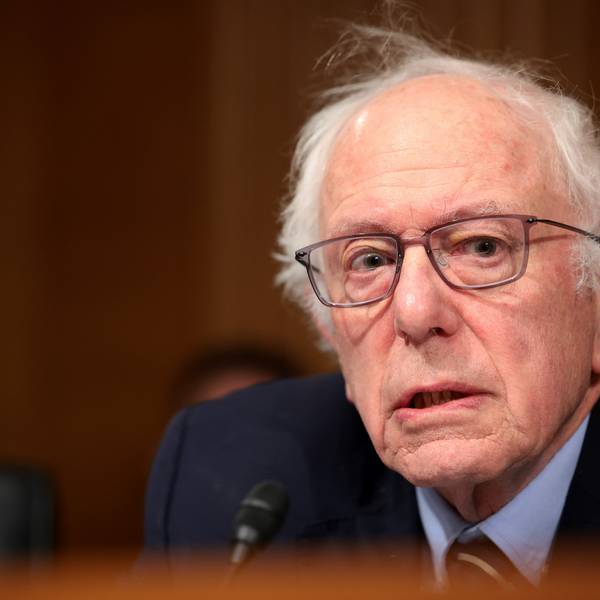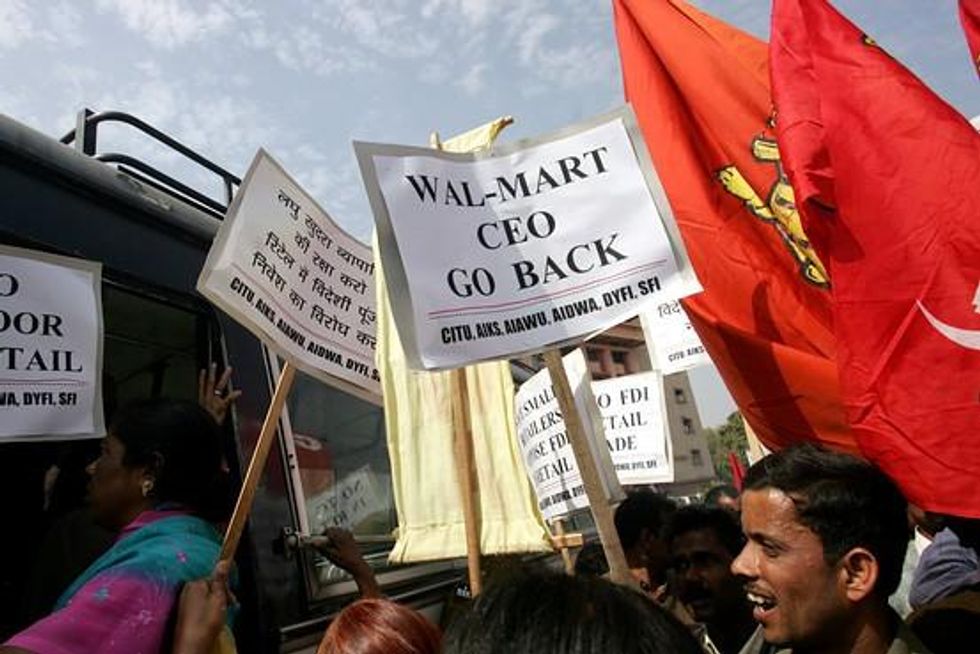India is a land of small farmers. According to the United Nations, the smaller the farm, the higher the productivity.
Small farms grow biodiversity. They are falsely described as unproductive because productivity in agriculture has been manipulated to exclude diversity and exclude costs of high chemical and capital inputs in chemical industrial agriculture. When biodiversity is taken into account, small farms produce more food and higher incomes.
In the heated debate on FDI in retail, those promoting it repeatedly claim that the entry of corporations like Walmart will benefit the Indian farmer. Reference is made to getting rid of the middleman.
Any trader who mediates in the distribution of goods between producers and consumers is a middleman. Walmart is neither a producer nor a consumer. Therefore, it is also a middleman; it is a giant middleman with global muscle. That is how it has become the world's biggest retailer, carrying out business of nearly $480 billion. So the issue is not getting rid of the middleman but replacing the small arthi with a giant one. The Walton Family is the global arthi located in the US, not in the local community. And this new kind of arthi combines the functions of all small traders everywhere from wholesale to retail. Instead of millions of small traders taking a two per cent commission at different levels, Walmart gets all profits. If three small traders mediate at two per cent between the producer and consumer, the difference between the farm price and consumer price is just six per cent. When Walmart enters the picture, the difference jumps with the farmer getting only two per cent of the consumer price and Walmart and its supply chain harvesting the 98 per cent. So the issue is not the number of middlemen but their size and their share of profits. It was to avoid this concentration of power over the agricultural produce market that India created the Agricultural Produce Marketing Committee (APMC) Act.
Our mandis are governed by cooperatives, which include farmers. No trader can buy more than a certain amount. This prevents monopolies. It creates a decentralised, democratic distribution system from wholesale to retail.
The government, especially the Planning Commission, has been trying very hard to dismantle the APMCs and mandis to facilitate the entry of big business in agriculture. The announcement of FDI in retail will radically change Indian agriculture. It threatens the survival of the small Indian farmer and the diversity of our farming systems.
Given the size of Walmart, it creates a monopsony through its buying power. It does not go to each small farmer and buys the five sacks of extra produce. It works through giant supply chains and giant suppliers which have no place for the small. Walmart and the small, independent farmer cannot coexist. When Walmart dominates, agribusiness dominates. Industry and corporations start to control agriculture.
We can already see early attempts at the industry takeover of agriculture to match centralised and giant production systems with centralised and giant retail. On March 5 this year, the government announced a new policy for the corporate control of agriculture called Public-Private Partnership for Integrated Agricultural Development (PPP-IAD) -- a scheme for facilitating large-scale integrated projects, led by private-sector players in the agriculture and allied sectors, with a view to aggregating farmers, creating critical rural infrastructure, introducing new technologies, adding value and integrating the agricultural supply chain.
The department of agriculture and cooperation has launched the PPP-IAD, which is proposed to cover 10 lakh farmers across India during the period 2012-17. Each of the integrated agricultural projects would involve engaging a minimum of 10,000 farmers. The scheme would accept proposals from private corporate entities on integrated agricultural development projects with the proviso that intervention must cover all aspects from production to marketing.
Subsidies will now go to corporations, not the farmers. In effect, 10,000 farmers will no longer be independent producers, but bonded to the corporation. These corporations will be Walmart's partners, not the small farmer.
This scheme , and the policy framework of which it is a part, is in effect a subversion of both land reforms and our food security. Land reforms in India got rid of zamindari and put land in the hands of the tiller. Land ceiling was introduced to ensure there would be no concentration of ownership over land. What the government is calling "reforms" are, in effect, anti-reform reforms, aimed at undoing every policy and law that we have put in place in independent and democratic India to ensure the rozi roti of the last person.
Walmart will harm and wipe out small farmers and businesses in India the way it has harmed farmers and retailers in the US. And because the density of small farmers and small retailers is higher in India than anywhere else in the world, the destructive impact will be magnified manifold.
The argument that we need FDI in retail was made when the government allowed Walmart to enter wholesale business in 2007. No infrastructure has been built, even though five years have passed. In any case, the government has given away crores in subsidies for warehouses and cold storages since it introduced "reforms". We need a black paper to assess all the public money that has already been spent on what the government says only Walmart can do.
And the more the government pushes policies towards monopolies and monocultures, the more committed I become to defend our economic democracy and diversity as a saner, more sustainable, more just alternative to the disease of giganticism.




